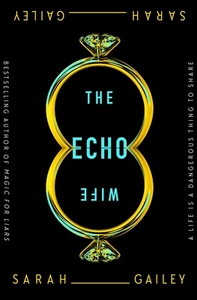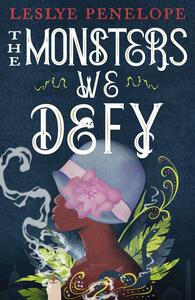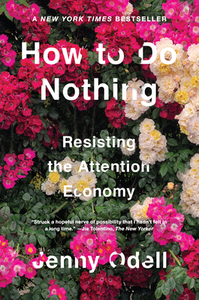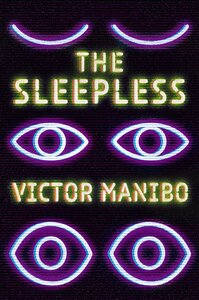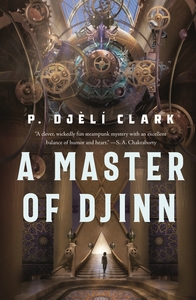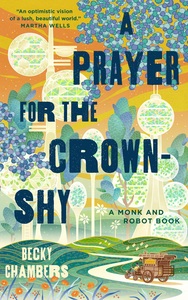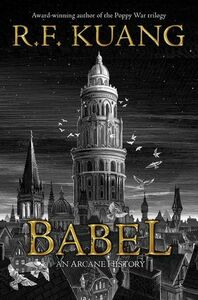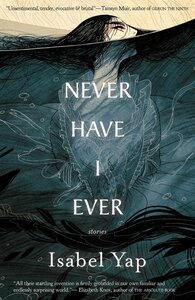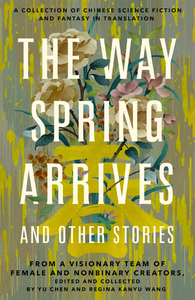You need to sign in or sign up before continuing.
Take a photo of a barcode or cover
derekisreading's Reviews (89)
This one was an original and captivating read, and I'll probably be thinking about it for a long time.
The Echo Wife by Sarah Gailey is a “domestic thriller with a cloning twist” in the sense that it's essentially the story of Dr. Evelyn Caldwell and Martine, the “other woman” Evelyn's husband Nathan left her for, who also happens to be her clone. Using a methodology that Evelyn pioneered, Nathan programmed Martine to be more caring, nurturing, and dependent on him (save your hatred for Nathan, it gets worse). As a premise, that should be enough, but the Echo Wife also offers an exploration of free will, of the ways in which we are all programed and conditioned, including (but not only) with respect to expectations around kindness and femininity. Our parents, the people around us, and our social institutions all play a role in pushing us to be one way or another, rewarding and punishing certain behavior, consciously or not.
In terms of narrative, I found the pacing to be a bit uneven, with high degrees of tension and suspense, but also very slow, character-driven action. In the first third of the novel, we’re waiting for the other shoe to drop, with as Evelyn gets ready for an awards banquet. Each flashback and detail is a Chekhov's gun waiting to go off. Her first meetings with Martine, are similarly tense. Things take a turn when their (ex-)husband proves himself worse than simply a cheater. While the second act is important – this is where we get into the more philosophical questions, see the relationship between Evelyn and Martine develop, and learn about some of Evelyn's past traumas – it is also slow. I didn't finish around this point the first time I tried to read it.
I'm so glad that I came back to it though; without spoiling it, the ending is honestly rather chilling. Though I didn't predict it, there is a certain inevitability to the way it works out. I kind of hoped for a bit more explicit self-awareness from Evelyn, but then again, you know she knows what is happening. I'm so glad that I came back to it; without spoiling it, the ending is honestly rather chilling. Though I didn't predict it, there is a certain inevitability to the way it works out. I kind of hoped for a bit more explicit self-awareness from Evelyn, but then again, you know she knows what is happening. Evelyn fits in perfectly with the “I am once again asking my main characters to go to therapy” crowd.
As a thought experiment and an exploration of free will, I thought The Echo Wife was brilliant. The relationship between Evelyn and Martine really anchored the story, somewhere between parent and child, professional mentor and mentee, scientist and research subject, and rivals. Other than Evelyn and Martine, none of the other characters seem too important, and that's OK – these two women with very similar DNA but very different experiences are more than enough for a tense and fascinating (if a bit uneven) story.
The Echo Wife by Sarah Gailey is a “domestic thriller with a cloning twist” in the sense that it's essentially the story of Dr. Evelyn Caldwell and Martine, the “other woman” Evelyn's husband Nathan left her for, who also happens to be her clone. Using a methodology that Evelyn pioneered, Nathan programmed Martine to be more caring, nurturing, and dependent on him (save your hatred for Nathan, it gets worse). As a premise, that should be enough, but the Echo Wife also offers an exploration of free will, of the ways in which we are all programed and conditioned, including (but not only) with respect to expectations around kindness and femininity. Our parents, the people around us, and our social institutions all play a role in pushing us to be one way or another, rewarding and punishing certain behavior, consciously or not.
In terms of narrative, I found the pacing to be a bit uneven, with high degrees of tension and suspense, but also very slow, character-driven action. In the first third of the novel, we’re waiting for the other shoe to drop, with as Evelyn gets ready for an awards banquet. Each flashback and detail is a Chekhov's gun waiting to go off. Her first meetings with Martine, are similarly tense. Things take a turn when their (ex-)husband proves himself worse than simply a cheater. While the second act is important – this is where we get into the more philosophical questions, see the relationship between Evelyn and Martine develop, and learn about some of Evelyn's past traumas – it is also slow. I didn't finish around this point the first time I tried to read it.
I'm so glad that I came back to it though; without spoiling it, the ending is honestly rather chilling. Though I didn't predict it, there is a certain inevitability to the way it works out. I kind of hoped for a bit more explicit self-awareness from Evelyn, but then again, you know she knows what is happening. I'm so glad that I came back to it; without spoiling it, the ending is honestly rather chilling. Though I didn't predict it, there is a certain inevitability to the way it works out. I kind of hoped for a bit more explicit self-awareness from Evelyn, but then again, you know she knows what is happening. Evelyn fits in perfectly with the “I am once again asking my main characters to go to therapy” crowd.
As a thought experiment and an exploration of free will, I thought The Echo Wife was brilliant. The relationship between Evelyn and Martine really anchored the story, somewhere between parent and child, professional mentor and mentee, scientist and research subject, and rivals. Other than Evelyn and Martine, none of the other characters seem too important, and that's OK – these two women with very similar DNA but very different experiences are more than enough for a tense and fascinating (if a bit uneven) story.
I don’t usually pick up a lot of historical fantasy, but this was a warm and lovely summer read. I’m so glad I got the chance to get into The Monsters We Defy by Leslye Penelope. So many things about it worked for me – the mystery/heist elements, the setting in 1920s Washington D.C., the unique spirit magics, and the ideas of second chances, classism/colorism, and destiny.
Set in 1920s Washington D.C. during the Harlem Renaissance, The Monsters We Defy follows Clara Johnson, who was born at a crossroads and can communicate with spirits. Some of these spirits, known as Enigmas, like to make deals with humans and will bestow a Charm granting a person magical ability as well as a Trick cursing that person with some other terrible experience. When she starts hearing about disappearances in town (largely poor folks), Clara learns that a special ring may be responsible. The catch is that the ring is held by one of D.C.’s wealthiest women. Clara needs to team up with others, some with Enigma Charms and some not, to try to keep the ring out of the wrong hands – before it’s too late.
Penelope’s gorgeous writing makes the story come alive. I love stories about magical deals, tricks, and bargains, and those scenes were great since we expect the Enigmas to be self-serving while also knowing that they can't lie. I also especially enjoyed the character portraits detailing the backstories of each crew member after we meet them, which read like folktales. There's Zelda (who is skilled in sleight of hand after her time in the circus), Israel (a musician who can influence with rhythms), Jesse (a man who can manipulate memories), and Aristotle (a man who can act in whatever role he chooses).
Clara's story is the focus, but I would have enjoyed learning a bit more about each of the secondary characters or reading from their perspective a bit more. Clara's development arc is pretty satisfying overall though, and it's good to see her go from barely trusting others to gradually opening up and showing some vulnerability. The ending wrapped everything up fairly cleanly, but I also feel like there is some room for more stories.
It took a little while for me to get used to the historical language, but I grew to enjoy the details, and I really appreciated the author’s note at the end describing the real-life Clara “Carrie” Johnson (and various other historical inspirations). Though most of the characters and their lives are fictional, you'll definitely recognize some of the names. The specter of racism and white supremacy is certainly present (sometimes as a literal specter in the form of a ghostly police officer), and there are mentions of Klan marches and a racist train passenger. I thought it was interesting how much of the conflicts were related to classism and colorism (which are of course influenced by racism), as the D.C. black elite exclude and exploit poorer classes.
Overall, I would recommend this book to anyone who enjoys stories about tricksters/fae/spirits and magical deals, people who are already interested in historical fantasy or 1920s D.C., and readers who like mystery/heist crew interactions with found family vibes.
Set in 1920s Washington D.C. during the Harlem Renaissance, The Monsters We Defy follows Clara Johnson, who was born at a crossroads and can communicate with spirits. Some of these spirits, known as Enigmas, like to make deals with humans and will bestow a Charm granting a person magical ability as well as a Trick cursing that person with some other terrible experience. When she starts hearing about disappearances in town (largely poor folks), Clara learns that a special ring may be responsible. The catch is that the ring is held by one of D.C.’s wealthiest women. Clara needs to team up with others, some with Enigma Charms and some not, to try to keep the ring out of the wrong hands – before it’s too late.
Penelope’s gorgeous writing makes the story come alive. I love stories about magical deals, tricks, and bargains, and those scenes were great since we expect the Enigmas to be self-serving while also knowing that they can't lie. I also especially enjoyed the character portraits detailing the backstories of each crew member after we meet them, which read like folktales. There's Zelda (who is skilled in sleight of hand after her time in the circus), Israel (a musician who can influence with rhythms), Jesse (a man who can manipulate memories), and Aristotle (a man who can act in whatever role he chooses).
Clara's story is the focus, but I would have enjoyed learning a bit more about each of the secondary characters or reading from their perspective a bit more. Clara's development arc is pretty satisfying overall though, and it's good to see her go from barely trusting others to gradually opening up and showing some vulnerability. The ending wrapped everything up fairly cleanly, but I also feel like there is some room for more stories.
It took a little while for me to get used to the historical language, but I grew to enjoy the details, and I really appreciated the author’s note at the end describing the real-life Clara “Carrie” Johnson (and various other historical inspirations). Though most of the characters and their lives are fictional, you'll definitely recognize some of the names. The specter of racism and white supremacy is certainly present (sometimes as a literal specter in the form of a ghostly police officer), and there are mentions of Klan marches and a racist train passenger. I thought it was interesting how much of the conflicts were related to classism and colorism (which are of course influenced by racism), as the D.C. black elite exclude and exploit poorer classes.
Overall, I would recommend this book to anyone who enjoys stories about tricksters/fae/spirits and magical deals, people who are already interested in historical fantasy or 1920s D.C., and readers who like mystery/heist crew interactions with found family vibes.
The Sleepless was a fascinating read that I'm going to be thinking about for a while. Victor Manibo constructs a compelling narrative with a queer Filipino protagonist while going deep on a not-too-distant future world that has changed drastically in a particular way.
Favorite part: the Sleeplessness in all its complexity
Vibes: near future sci-fi noir thriller, philosophical, queer, anticapitalist-ish
Should the main character go to therapy?: He's in therapy! He still has some unresolved issues! He's working through things!
What would you do if you didn't need to sleep? In the year 2043, a pandemic of uncertain origins causes a significant proportion of people to become Sleepless. Jamie Vega, a reporter and producer for investigative journalism show The Simon Parrish Files, is one of the Sleepless. When he finds his (somewhat toxic) boss and mentor, the eponymous Simon Parrish, dead in his office, Jamie investigates. Though it first seems to be a suicide, Jamie finds himself at the center of an investigation and must confront his own internalized shame as he slowly unravels a broader conspiracy which has to do with Sleeplessness itself.
Sleeplessness works in several different ways, and its ambiguity is one of the aspects that stuck with me the most. I read in a lot of different metaphors at different times. The language around it is queer (characters who become Sleepless refer to being “out” and/or “transitioning”). It is an identity more generally (”Sleepless and proud!”), and there are both Sleepless hate groups and Sleepless supremacist groups. It's also linked to productivism and work under capitalism. This – Sleeplessness as hustle culture and the need for continuous productivity – so clearly works in my mind. Being Sleepless grants you extra time to live, to develop side hustles and hobbies, and ultimately to work (read: be exploited by) multiple jobs. Of course, perhaps we wouldn't feel so much of a need for extra time if we had more ownership over the time we do have.
The novel spends a fair amount of time just building out this world and thinking about how existing structures of power take advantage of the consequences of this pandemic of Sleeplessness. I honestly would have liked to see even more, such as a more thorough look at how Sleeplessness intersects with other identities and more of a disability justice lens around Sleeplessness as an actual condition.
All in all, the detail that already exists is impressive. Sleeplessness contains multitudes, but I also think it needs to be viewed as its own (fictional) thing which has different aspects at different times. For example, when discussing the possibility of a “cure” for Sleeplessness, the main thing we need a cure from is always-on hustle culture and the need to be doing things.
As far as plot goes, the pacing felt a bit slow in the beginning, but in kind of a noir detective style, it picked up. Certain plot points later in the novel, especially Part 2 and Part 3, felt very thriller-y, and SpoilerI'm a little suspicious of fighting one evil corporate conspiracy funded by billionaires with some sort of academic nudge squad collective ... also funded by billionaires.
Overall, I would recommend this book to readers who are interested in neo-noir/mystery/thriller stories, sci-fi premises, and intriguing world building. I'm looking forward to seeing what Victor Manibo writes in the future!
I received an eARC thanks to Edelweiss and the publisher Erewhon Books.
Favorite part: the Sleeplessness in all its complexity
Vibes: near future sci-fi noir thriller, philosophical, queer, anticapitalist-ish
Should the main character go to therapy?: He's in therapy! He still has some unresolved issues! He's working through things!
What would you do if you didn't need to sleep? In the year 2043, a pandemic of uncertain origins causes a significant proportion of people to become Sleepless. Jamie Vega, a reporter and producer for investigative journalism show The Simon Parrish Files, is one of the Sleepless. When he finds his (somewhat toxic) boss and mentor, the eponymous Simon Parrish, dead in his office, Jamie investigates. Though it first seems to be a suicide, Jamie finds himself at the center of an investigation and must confront his own internalized shame as he slowly unravels a broader conspiracy which has to do with Sleeplessness itself.
Sleeplessness works in several different ways, and its ambiguity is one of the aspects that stuck with me the most. I read in a lot of different metaphors at different times. The language around it is queer (characters who become Sleepless refer to being “out” and/or “transitioning”). It is an identity more generally (”Sleepless and proud!”), and there are both Sleepless hate groups and Sleepless supremacist groups. It's also linked to productivism and work under capitalism. This – Sleeplessness as hustle culture and the need for continuous productivity – so clearly works in my mind. Being Sleepless grants you extra time to live, to develop side hustles and hobbies, and ultimately to work (read: be exploited by) multiple jobs. Of course, perhaps we wouldn't feel so much of a need for extra time if we had more ownership over the time we do have.
The novel spends a fair amount of time just building out this world and thinking about how existing structures of power take advantage of the consequences of this pandemic of Sleeplessness. I honestly would have liked to see even more, such as a more thorough look at how Sleeplessness intersects with other identities and more of a disability justice lens around Sleeplessness as an actual condition.
All in all, the detail that already exists is impressive. Sleeplessness contains multitudes, but I also think it needs to be viewed as its own (fictional) thing which has different aspects at different times. For example, when discussing the possibility of a “cure” for Sleeplessness, the main thing we need a cure from is always-on hustle culture and the need to be doing things.
As far as plot goes, the pacing felt a bit slow in the beginning, but in kind of a noir detective style, it picked up. Certain plot points later in the novel, especially Part 2 and Part 3, felt very thriller-y, and SpoilerI'm a little suspicious of fighting one evil corporate conspiracy funded by billionaires with some sort of academic nudge squad collective ... also funded by billionaires.
Overall, I would recommend this book to readers who are interested in neo-noir/mystery/thriller stories, sci-fi premises, and intriguing world building. I'm looking forward to seeing what Victor Manibo writes in the future!
I received an eARC thanks to Edelweiss and the publisher Erewhon Books.
When I heard about this anthology of Chinese science fiction and fantasy by women and nonbinary authors, it immediately went to the top of my TBR list. The Way Spring Arrives did not disappoint – it was a really engaging collection as a whole and there were a number of standouts that left me thinking for a long time.
In her essay “The Futures of Genders in Chinese Science Fiction”, Jing Tsu writes “If today's sci-fi writers, exemplified in the current volume, decide to seek new linkages with China's past, it is not for the sake of a nostalgic return but to reinvent a path of discovery through myth and folklore.” There isn't really a single uniting theme to these stories, other than the shared nationality and genders of the authors, but many (perhaps most) of them are in conversation with Chinese myth, folklore, and other storytelling forms.
Not only do many of these stories twist, subvert, or draw upon mythology, but the act of translation itself changes them as well. As Yilin Wang writes in her essay describing translation of two stories, “When a story is translated from Chinese into English, it is never an exact replica; it undergoes transformation, however subtle, as it is recreated in a new language and cultural context.” Though I mainly bought the book for the stories, I also really appreciated the essays giving translators a chance to discuss language, their process of translation, or comment on the state of Chinese literature in general. As a Chinese person who grew up in the U.S. with little cultural context of China, knowing about the translators’ intentional choices was super valuable – I would've even been happy with more of it.
“Dragonslaying,” written in Chinese by Shen Yingying and translated to English by Emily Xueni Jin, was devastating and one of my favorites of the collection. It challenged the (Western, masculine) assumptions that I had about stories with that title. It's the story of Su Mian, one of few women doctors from the city, who travels to a distant province to learn about the art of dragonslaying. It's dark, brutal, and intimate, yet also clinical at times, interspersing narrative with excerpts from medical textbooks on the nature of the jiaoren. The change in tone highlights the banality of violence as accepted fact. In Western mythology, dragonslaying is often a celebrated act by a singular (male) hero – defeating the monster, slaying the beast, rescuing the princess. Without spoiling too much, this “Dragonslaying” is not that dragonslaying.
Ultimately, all of the stories were worth reading, and it’s hard for me to pick favorites. For example, the opening story “The Stars We Raised” captures the careless possibility and cruelty of youth, and “What Does the Fox Say?” is a lovely piece of flash fiction exploring meaning and storytelling. “The Restaurant at the End of the Universe: Tai-Chi Mashed Taro” references the Douglas Adams setting of course, but it's also a meditation on memory and beauty and life and the origins of a particular painting and poetic passage, flipping between the lives of a couple people in Ming Dynasty China and the end of the universe. “The Way Spring Arrives” tells an epic tale of the arrival of spring rains, warmer weather, and the tilting of the earth's axis by way of the actions of a few dedicated deities. “A Brief History of Binakan Disasters as told in a Sinitic Language” hearkens to a somewhat different sci-fi subgenre. It features a self-destructive species (surprisingly not human!) which deals with ecological crises with wildly oppressive (even geocidal) methods. On a slightly lighter note, I thought “The Mountain and the Secrets of their Names” did a great job of highlighting the contradictions of a small village with its own traditions and ancestral practices against the backdrop of a modernizing Chinese state launching satellites. The idea of a oral naming tradition as an algorithm is meaningful to me as well as someone who works with computer algorithms, and I will likely return to it for some further reflection.
Overall, I would highly recommend this book for anyone interested in science fiction, fantasy, and mythic retellings written and translated by an amazing group of Chinese women and non binary people. The way it interpolates past and future translates to a unique and fulfilling reading experience.
5/5 stars
It is not for the sake of a nostalgic return but to reinvent a path of discovery through myth and folklore.
In her essay “The Futures of Genders in Chinese Science Fiction”, Jing Tsu writes “If today's sci-fi writers, exemplified in the current volume, decide to seek new linkages with China's past, it is not for the sake of a nostalgic return but to reinvent a path of discovery through myth and folklore.” There isn't really a single uniting theme to these stories, other than the shared nationality and genders of the authors, but many (perhaps most) of them are in conversation with Chinese myth, folklore, and other storytelling forms.
Not only do many of these stories twist, subvert, or draw upon mythology, but the act of translation itself changes them as well. As Yilin Wang writes in her essay describing translation of two stories, “When a story is translated from Chinese into English, it is never an exact replica; it undergoes transformation, however subtle, as it is recreated in a new language and cultural context.” Though I mainly bought the book for the stories, I also really appreciated the essays giving translators a chance to discuss language, their process of translation, or comment on the state of Chinese literature in general. As a Chinese person who grew up in the U.S. with little cultural context of China, knowing about the translators’ intentional choices was super valuable – I would've even been happy with more of it.
“Dragonslaying,” written in Chinese by Shen Yingying and translated to English by Emily Xueni Jin, was devastating and one of my favorites of the collection. It challenged the (Western, masculine) assumptions that I had about stories with that title. It's the story of Su Mian, one of few women doctors from the city, who travels to a distant province to learn about the art of dragonslaying. It's dark, brutal, and intimate, yet also clinical at times, interspersing narrative with excerpts from medical textbooks on the nature of the jiaoren. The change in tone highlights the banality of violence as accepted fact. In Western mythology, dragonslaying is often a celebrated act by a singular (male) hero – defeating the monster, slaying the beast, rescuing the princess. Without spoiling too much, this “Dragonslaying” is not that dragonslaying.
Ultimately, all of the stories were worth reading, and it’s hard for me to pick favorites. For example, the opening story “The Stars We Raised” captures the careless possibility and cruelty of youth, and “What Does the Fox Say?” is a lovely piece of flash fiction exploring meaning and storytelling. “The Restaurant at the End of the Universe: Tai-Chi Mashed Taro” references the Douglas Adams setting of course, but it's also a meditation on memory and beauty and life and the origins of a particular painting and poetic passage, flipping between the lives of a couple people in Ming Dynasty China and the end of the universe. “The Way Spring Arrives” tells an epic tale of the arrival of spring rains, warmer weather, and the tilting of the earth's axis by way of the actions of a few dedicated deities. “A Brief History of Binakan Disasters as told in a Sinitic Language” hearkens to a somewhat different sci-fi subgenre. It features a self-destructive species (surprisingly not human!) which deals with ecological crises with wildly oppressive (even geocidal) methods. On a slightly lighter note, I thought “The Mountain and the Secrets of their Names” did a great job of highlighting the contradictions of a small village with its own traditions and ancestral practices against the backdrop of a modernizing Chinese state launching satellites. The idea of a oral naming tradition as an algorithm is meaningful to me as well as someone who works with computer algorithms, and I will likely return to it for some further reflection.
Overall, I would highly recommend this book for anyone interested in science fiction, fantasy, and mythic retellings written and translated by an amazing group of Chinese women and non binary people. The way it interpolates past and future translates to a unique and fulfilling reading experience.
5/5 stars
